[ad_1]
WASHINGTON — As a US citizen, Kamal Nawash should be able to travel relatively seamlessly through Israel’s Ben Gurion Airport, like any other American.
Nawash used to transit through the airport frequently on trips to visit family living in the Palestinian territories. While Israel generally bars Palestinians from traveling via Ben Gurion, Nawash’s name was dropped from the Palestinian Authority’s population registry four decades ago, leaving only his American citizenship and what should have been a pain-free process.
But in 2005, he was held for five hours for a repetitive line of questions regarding the purpose of his visit from security agents who wanted to confirm that he was not seeking to permanently move back to Jerusalem, his former home.
“Eventually, they let me in, but just before they did, the guy questioning me said, ‘Look, Kamal, if you don’t want to go through this again, you should travel through Allenby next time,’” Nawash, 52, told The Times of Israel.
So that’s what the Washington-based attorney has done ever since, extending his travel time by an entire day in order to fly to Amman, drive to the Allenby Crossing between Jordan and the West Bank, and wait in line for hours while undergoing similar rounds of questioning before being let in. This extended route is the one taken by just about all West Bank Palestinians, who are barred from using Israel’s airport or building their own.
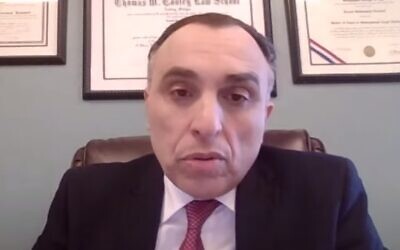
Kamal Nawash speaks at an event organized by the Carnegie Endowment for International Peace on February 14, 2023. (Screen capture/YouTube; used in accordance with Clause 27a of the Copyright Law)
Nawash’s status may be unique, but just about every Palestinian has a story about the hardships of travel in and out of the territories under Israeli military control.
These stories appear to have resonated with US Ambassador to Israel Tom Nides, who has aggressively lobbied Israel to expand the operating hours at the Allenby crossing in order to shorten the perennially long wait times endured by its predominantly Palestinian passengers.
At the same time, the Biden administration is working to help Israel become the 41st member of the US Visa Waiver Program, or VWP.
For Israelis, the move would represent a massive gesture cementing the alliance between Washington and Jerusalem, and just as importantly, will allow them to visit the US on tourist visas without needing to receive travel papers from the embassy beforehand, a lengthy and often onerous process. Successive Israeli governments have made joining the VWP a major policy goal, a sign of the importance Israel places on the issue.
For Palestinians with US citizenship, the situation has put them in the somewhat awkward situation of rooting for Israel to succeed, thanks to the US demand that entry into the VWP be accompanied by reciprocal freedom of movement for all Americans, including those who are also Palestinian.
“Reciprocity is a requirement. In fact, freedom of travel is a basis of the Visa Waiver Program,” Nides said in January when he announced that Israel had cleared a major hurdle in its bid for VWP membership. He noted then that Jerusalem still had to check off several other requirements, including guaranteeing reciprocity for all American travelers.
Important progress on the visa waiver program – watch this video for more information. For U.S. passports, “Blue is blue.” pic.twitter.com/1FqaJu5b7D
— Ambassador Tom Nides (@USAmbIsrael) January 30, 2023
“It means… Arab Americans, including Palestinian-Americans, will be able to get on a plane in New York or Detroit and fly directly to Ben Gurion Airport. You can then go visit your aunt in Bethlehem — all on your blue American passport,” Nides explained.
This is why Nawash has been closely following Israel’s quest for entry into the VWP. It might not solve the Israeli-Palestinian conflict’s more protracted elements, but it would theoretically ease a travel headache that hundreds of thousands of Americans of Palestinian descent have been enduring for decades.
Green light from the Shin Bet, but not from the government
Aside from invasive security checks, some travelers to Israel also have to contend with uncertainty surrounding entry rules, which are often vague and can seem arbitrary and inconsistent, especially when transmitted via mercurial security agents.
“Once you get to the airport, it’s a completely different experience based on whether you’re Palestinian or Israeli,” said Madees Khoury, a Palestinian-American who runs the Taybeh Brewing Company in the West Bank. “Once they see you’re Palestinian, they pull you aside and you’re told to wait until someone comes for a security check.”
Khoury noted that the security check was more invasive than a standard search and she admitted to having undergone several “humiliating” strip searches in the past.
“They physically search you. If you need to take off your shirt or your bra, you obviously have to comply,” said Khoury. “Once you get to your destination and open your suitcase, you see a note from the security that they went through your things as well and that if anything is missing, you should report it.”
Israel generally justifies its use of racial profiling, intensive security checks and restrictions on Palestinians as part of its efforts to thwart terror. Many of its air travel security policies are an outgrowth of previous decades when Palestinian terror groups and allied organizations successfully or unsuccessfully attempted to hijack or blow up planes carrying Israelis.
Under the VWP, Israel may be limited in the kind of restrictions it can place on Palestinian-Americans and other American Arabs moving through the airport.
“The Shin Bet has made clear to both the Americans and our political echelon that we do not oppose the US requirements for the Visa Waiver Program,” a senior Israeli security official said on condition of anonymity.
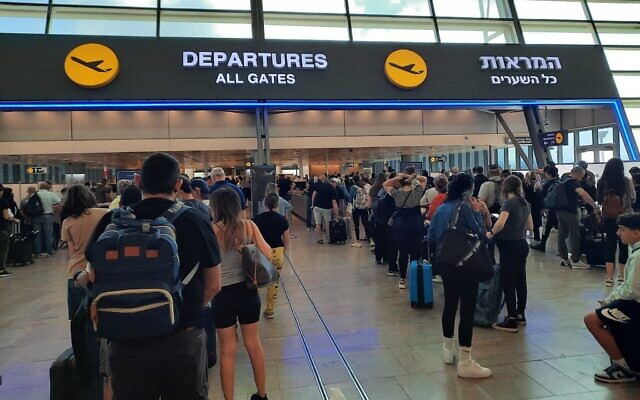
Lines for security screening at Ben Gurion Airport, June 26, 2022. (Amy Spiro/Times of Israel)
Spokespeople for the Coordinator for Government Activities in the Territories (COGAT), the Population Immigration and Border Authority (PIBA), and the Shin Bet security agency declined repeated requests to explain Israel’s policy vis-à-vis the travel rights of Palestinians and Palestinian-Americans.
But while the security establishment might not take issue with allowing Palestinian-Americans to use Ben Gurion Airport, some in the current hardline government previously balked at American dictates regarding easing restrictions on travelers, citing security concerns.
“Allowing any American Palestinian to enter [the West Bank] without a security check is problematic,” Likud MK Nir Barkat said last year, explaining his party’s refusal to back efforts by then-prime minister Naftali Bennett’s government to secure VWP membership.
While some experts say security concerns are real, Likud’s support last month of VWP legislation nearly identical to the measures it previously torpedoed seemed to undercut the gravity of the party’s objections.
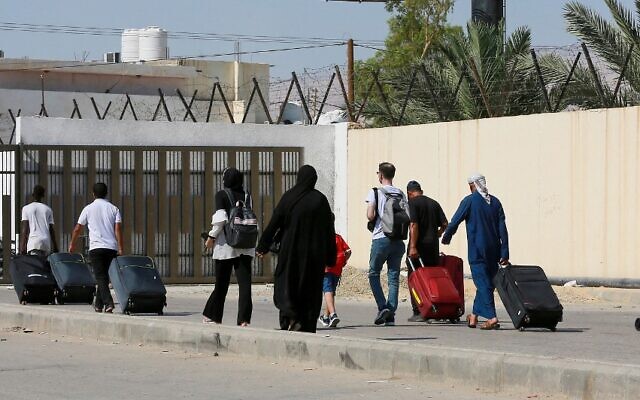
Passengers arrive on the Jordanian side of the Allenby Bridge crossing between the West Bank and Jordan on July 19, 2022. (Khalil Mazraawi/AFP)
Still, some Israeli officials have proposed allowing Palestinians to fly out of Ramon Airport near the southern town of Eilat, instead of Ben Gurion. This idea has been presented before but has yet to be implemented on a large scale. It also poses a less-than-ideal solution for Palestinians living in the northern West Bank — a roughly four-hour drive from Ramon.
A well-documented problem
US officials have made clear that easing travel for Palestinian-Americans and other American Arabs is a priority of the VWP.
A State Department travel advisory warns, “Some US citizens of Arab or Muslim heritage (including Palestinian-Americans) have experienced significant difficulties and unequal and occasionally hostile treatment at Israel’s borders and checkpoints.”
“US citizens who have traveled to Muslim countries or who are of Arab, Middle Eastern, or Muslim origin may face additional questioning by immigration and border authorities,” the advisory continues.
According to Nides, the eventual VWP agreement between Israel and the US will include “snapback” mechanisms allowing the US to remove Israel from the VWP if it mistreats Palestinian-Americans or other US passport holders.
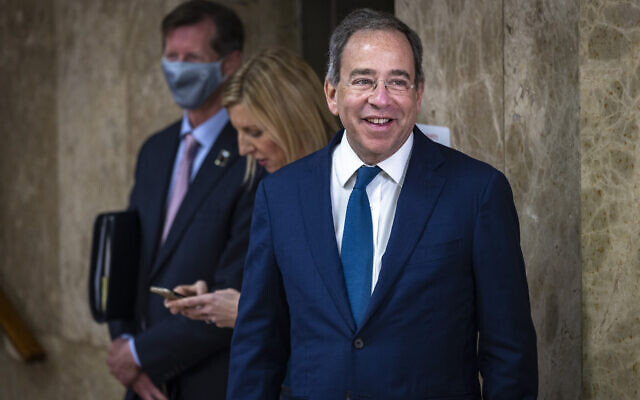
US Ambassador to Israel Tom Nides, at the Prime Minister’s Office in Jerusalem, on March 27, 2022. (Olivier Fitoussi/Flash90)
Such snapback clauses exist in other visa waiver agreements that the US signed, and at least one country has been booted from the program. The US removed Argentina in 2002, as the country’s economic crisis led to a massive uptick in travelers overstaying their visas in the US.
Oded Raz, the former deputy head of the Shin Bet’s security services division, claimed that there had been a significant improvement in the treatment of Arab travelers at Ben Gurion Airport in recent years.
“Until 15 years ago, Arab travelers underwent security checks at the check-in counter where their bags would be opened in front of everyone. That is no longer the case,” he said, giving one example. “Thanks to improvements in technology, we made the decision to treat them the same as all Jewish travelers.”
“Of course, if someone is on a [security-risk] list, they are pulled aside for additional questioning, but this is the exception, not the rule,” Raz said.
He noted that Israel’s primary concern regarding Arab travelers was that they would seek to remain in the country indefinitely.
“There is similar concern regarding [non-Jewish] travelers from China and Russia who endure these extra security checks as well,” said the former Shin Bet deputy.
Raz added that wait times at security lines will shrink when Ben Gurion Airport finishes its planned expansion of Terminal 3 — which houses most international gates — in the next few years.
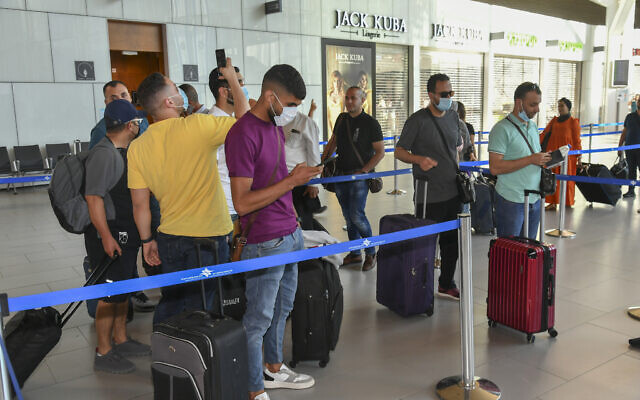
Palestinian residents of the West Bank are seen ready to board a flight at Ramon Airport on August 22, 2022.(Flash90)
The limited value of a US passport
Khoury, who runs the Taybeh Brewing Company, is one of the few Palestinians allowed to use Ben Gurion since she has a so-called BMC permit. The special document is intended to ease international travel and trans-Green Line commerce for roughly 3,500 Palestinian businesspeople, including Khoury, who sells her Taybeh beer inside Israel.
But even she must apply for a new permit from COGAT each time she needs to make the short journey from her West Bank home to the airport.
The senior Israeli security official confirmed that PA citizens, including those with US citizenship, are barred from using Ben Gurion Airport unless they receive the special permit from COGAT.
“This has been a long-standing policy based on various security considerations,” the official said, while declining to elaborate on what those security considerations are.
Adding to the stress of travel plans, Palestinians are told not to apply for a permit until roughly a week before their flight. They are then left in limbo until a day or two before takeoff when they receive an answer.

This grab from AFPTV footage shot on September 2, 2022, shows Madees Khoury, head of the Palestinian Taybeh brewery, speaking during an interview with AFP amid the annual Oktoberfest beer festival, east of the West Bank city of Ramallah. (Photo by AFP)
The uncertainty forces many to purchase travel insurance and a backup flight through Jordan in case COGAT denies the permit request.
“You’re on your toes until the very last minute,” Khoury said.
Approval is far from a given. Khoury has been forced to fly through Jordan several times after being rejected by COGAT. Aside from the distance and extra wait times and costs, Khoury noted that flights from Queen Alia Airport in Amman were often pricier.
And because the Allenby crossing has not always been open, those with morning flights often need to cross a day early and book a hotel in Amman or rough it in the terminal.
Starting April 2, though, Israel began operating Allenby around the clock during weekdays, until 3:30 p.m. on Fridays and from 8 a.m. to 3:30 p.m. on Saturdays.
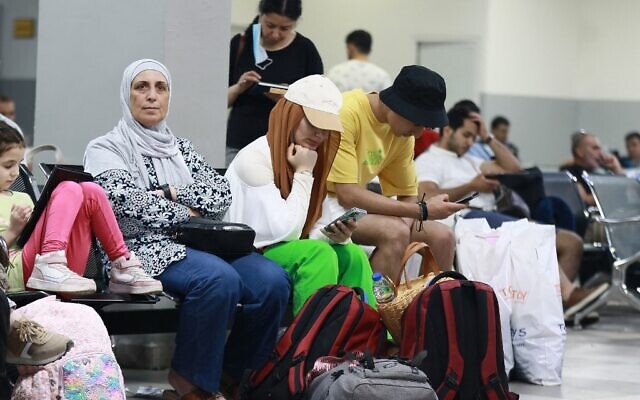
Passengers sit in a waiting room on the Jordanian side of the Allenby Bridge crossing between the West Bank and Jordan on July 19, 2022. (Khalil Mazraawi/AFP)
Disputes on defining reciprocity
Last month, the coalition passed the final piece of a legislative package required of all VWP applicants. The data sharing and information systems across various government bodies established by the legislation must be developed, implemented and tested ahead of the September 30 deadline.
While Prime Minister Benjamin Netanyahu announced after the laws were passed that Israel’s VWP entry was all but assured, the US Embassy in Jerusalem was quick to clarify that Israel still had to finalize its obligation to ensure reciprocal travel rights for all Americans.
According to Nides, the reciprocity commitment will be enshrined in a formal agreement he is crafting for Israel to sign upon entry into the VWP. The definition will be limited to travel through Ben Gurion Airport, meaning Israel won’t be obligated to grant wider travel rights to the approximately 55,000 Palestinian Americans on the PA’s population rolls.
“If you want to stop in Tel Aviv on the way to the airport once you get your permit that should be fine, but this is not about [other] travel in and out of checkpoints,” the ambassador told The Times of Israel.
Nides’s understanding of reciprocity might not be shared by all in the Biden administration, though.
During a January press briefing, US State Department spokesman Vedant Patel read out a prepared statement that said Israel would have to grant permission to all US citizens, “including Palestinian-Americans and Arab Americans, to travel to and through Israel.” He did not condition the policy on the travel going through Ben Gurion Airport.

A Muslim couple poses for a picture at the Duty Free at Ben Gurion International Airport in Tel Aviv, Israel on April 30, 2016. (Nati Shohat/Flash90)
American Federation of Ramallah chair Hanna Hanania told The Times of Israel that he and other influencers in the Palestinian-American community have been lobbying the Biden administration to adopt the more expansive interpretation described by Patel.
“Equal treatment means equal treatment,” he argued. “If an Israeli comes to the US, they’re not told that they can go to Chicago but not to Washington. We’ve told Biden officials that this must be what is meant when they say reciprocity.”
While there are no official figures, American Federation of Ramallah chair Hanania estimated that there are roughly 500,000 US citizens of Palestinian descent and that roughly one-tenth of them are in the PA’s population registry — for whom Ben-Gurion Airport would seemingly be off limits.
For Khoury, Israel’s treatment of her and other Palestinians diminishes the value of having Uncle Sam in your pocket.
“My American passport has great value all over the world, but it is completely useless here when you’re a Palestinian,” she said.
American citizens are able to travel freely around Israel and go in and out of the West Bank, but “as long as you’re also Palestinian, your Palestinian identity is the only one that matters to Israel.”
“I need a permit to go to Jerusalem. I need a permit to go to Tel Aviv. I need a permit to do business,” Khoury lamented.
Nides said that guaranteeing the ability of Palestinian-Americans to travel through Ben Gurion “is one of the most important reasons for why we’re doing this.”
“There’s no wiggle room on this,” he said. “Securing reciprocity is the only way we’re going to get the Visa Waiver Program done.”
[ad_2]
Source link


